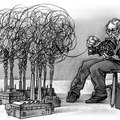From Economist.com
Can a private-equity firm repair Chrysler?
| |
 | |
FOR SALE: used Chrysler; one owner since 1998; was good runner but now in need of some attention; cost $36 billion; any reasonable offer considered. Call Stuttgart and ask for Dr Z.
Earlier this year when Dieter Zetsche, DaimlerChrysler’s boss, admitted that the company might sell its American arm, he would have been acutely aware of depreciation in the second-hand car market. With the bidding over on Monday May 14th, Daimler (as the German arm will now be called) has accepted an offer worth only $7.4 billion from Cerberus, a private-equity firm, for just over 80% of Chrysler. This values the American carmaker at roughly a quarter of what Daimler-Benz paid for it nine years ago.
Much of Cerberus's money will go to prop up Chrysler's operations and when all the costs of the deal are taken into account Daimler will have to pay $650m to get the American firm off its hands. But at last Daimler can drive away from the failed merger to concentrate on selling profitable, luxury cars. And although Cerberus has bought itself a carmaker with serious problems under the bonnet, the private-equity firm arrives with a reputation for wielding a big spanner.
America’s carmakers have been languishing as Asian firms prosper. This year Toyota it set to overhaul General Motors as the world’s leading car firm, and the proportion of cars that Detroit’s big three sell in America is still declining. But there are signs that all three of the firms are ready to make changes: they have each cut (or at least plan to do so) their workforces, through union-mollifying buy-outs; both Ford and GM have wrested some concessions on health care and pensions from their workers, helping to lower the long-term costs of making cars.
Chrysler responded to a rotten year in 2006 with plans to lay off 13,000 people, about 16% of the workforce. By 2009 the car firm expects to have cut planned production by about 400,000 vehicles a year (last year it sold 2.7m). Tom LaSorda, Chrysler’s boss and the architect of these cutbacks, will stay on. Cerberus stressed its support for his plans, but more audacious cuts both to jobs and benefits cannot be far off. Although Chrylser will come into its hands debt free, the private-equity firm will still have to cope with pensions and health-care liabilities that top $18 billion (another burden of which Daimler is glad to rid itself). Cerberus is expected to challenge the generous terms of employment won by car workers in the days when Detroit dominated the world and competitors were mere specks in the rear-view mirror.
Ron Gettelfinger, the boss of the United Auto Workers union, welcomed the news of Chrysler’s new owners, suggesting it was in the “best interests” of the company and its workers. But he had earlier made it clear that he would have rather seen Magna, a Canadian car-parts firm, become the new owner. Private-equity’s reputation (and its business model) calls both for financial re-engineering and for big cuts in costs, and Cerberus has shown toughness in previous deals. Mr Gettelfinger’s happy endorsement may indicate that the workers are not looking for confrontation, but the union’s four-year contract with Detroit’s carmakers is set for renewal later this year.
So far GM, Ford and DaimlerChrysler have all backed away from a showdown with the unions, fearing the costs of strikes and disruption to production. Cerberus might be more willing to push for deep cuts in the workforce, and less troubled by the threat of industrial unrest, as reforming the carmaker is the means by which the private-equity firm can make a profit. Cerberus is keen to stress that it has a “good record” with unions, although it is unclear whether that is the result of conquest or accommodation.
The challenge for Cerberus and Chrysler is to persuade workers that painful reforms, and the design and production of cars that consumers actually want to buy, will produce beneficial results for all involved. If that proves possible, Detroit’s other two car giants may also stand to benefit from private equity’s foray into the mainstream of American carmaking. The alternative, the continued decline of the long-term health of the American car industry, looks far less attractive.





